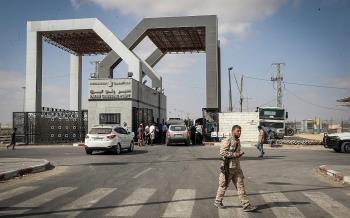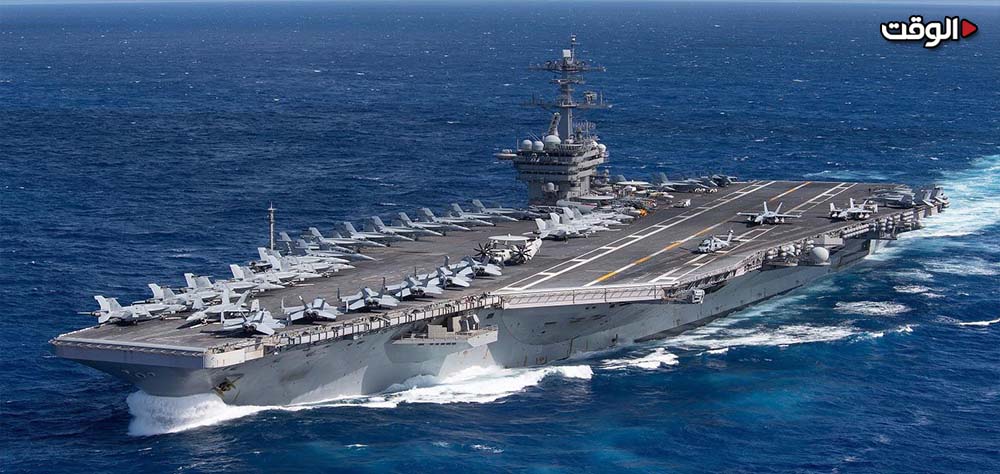Alwaght- An American aircraft carrier is leaving the region after a four-month mission in the Red Sea. This was confirmed by US sources who said that the mission of USS Dweight D. Eisenhower in the Red Sea has ended.
Reacting to the reports of the American aircraft carrier withdrawal from the Red Sea, member of Yemen's Supreme Political Council Mohammed Ali al-Houthi in an X post said that "if America claims reduction of the operations of Yemeni Armed Forces to save its face, back down from militarization of the sea, and send a message to the insurance companies, this is a positive self-deception... But if it sees a real decrease in operations, then it should direct its ships and the ships of its protégé Israel to sail again to be a delicious catch for our forces."
Earlier on Friday, the US Navy announced that the aircraft carrier USS Dwight D. Eisenhower and the USS Gravely destroyer passed through the Suez Canal to the Eastern Mediterranean after being in the Red Sea in a mission for about four months.
Total defeat
Many sources described the retreat of the US aircraft carrier as carrying hallmarks of defeat of the US-led naval mission in the Red Sea that was launched earlier this years against Yemen that imposes a ban on Israeli ships and ports in solidarity with Gaza. About five months ago, the US claimed it formed the so-called naval coalition to check the Yemeni operations in the Red Sea, but Yemenis have carried out nonstop missile and drone attacks on the Israeli and allied commercial ships as well as Western naval vessels. Simply said, the American coalition has been far from being able to stop Yemeni attacks over the past months.
Beyond falling to form a naval coalition, the Biden administration appears to lack a well-designed plan to manage the crisis in the region. In other words, despite the fact that the White House claims to be a controller of the crisis, it is actually a party to it. The unconditional support of the Biden administration to Netanyahu in the Gaza war has compounded the crisis in the region. Many agree that if it was not for the US backing to the Israeli government, Gaza war would have likely ended very soon and end of Gaza conflict would mean end of Yemen's operations in the Red Sea as Sana'a has repeatedly reiterated that it continues its military operations against Israeli and allied interests as long as genocidal war on Gaza goes on.
The US tough job against Yemen
A set of reasons can be mentioned for the failure of the US operations in the Red Sea against the Yemeni forces.
Complexity of Yemen's internal environment: Certainly the Americans have not had an adequate knowledge of Yemen's internal environment and it has been impossible for them to counter all the targets in this country. American officials themselves have admitted that it was challenging to locate the weapon storages in Yemen. According to them, there are many blind spots in Yemen's mountainous terrain, and it is impossible for the American military to identify all of these spots.
Yemenis' prior experience: It should not be ignored that it is not the first time Yemenis are fighting a war. Over the past 8 years, Yemen fought a war against a Saudi-led Arab coalition that failed to make gains against the Yemenis and at the end of the road chose negotiations over war. Actually, Yemen entered the war with the US with an eight-year war experience and it is natural that eight years of war experience provided a precious opportunity for Yemen to enter a new conflict with the US. It can be said that during the war, the Yemenis showed their adaptability and ability to withstand the damage of the air attacks led by Saudi Arabia in scattered mountainous and urban areas, and this adaptability was useful for guarding against recent American bombing.
"It is very difficult to imagine a strategy that can force the Yemenis to stop their attacks," said Thomas Juneau, an assistant professor at the Graduate School of Public and International Affairs at the University of Ottawa.
Failing to make political coalitions: It should be taken into account that the Americans failed not only in their military coalition against Yemen, but also in building a regional political coalition against Sana'a. From 15 regional countries, only 2 countries, Bahrain and the UAE, voiced their backing to the military coalition against Yemen, but others chose not to stand against Sana'a. In other words, the anti-Yemeni military action lacked a regional consensus. Unlike Washington, Yemen was successful in its political alliance in the region and not only had the support of Iran and Islamic communities and Arab citizens supporting Palestine behind it, but also Yemeni military operations against Israel and Israeli-bound ships during the Gaza war made heroes of liberation of Palestine from Yemeni forces. Also, Yemeni contacts with Russia during the operations showed that Sana'a had the support of Kremlin and that Moscow was not opposed to their Red Sea operations. This has, undoubtedly, made the conditions difficult for the Americans.



























